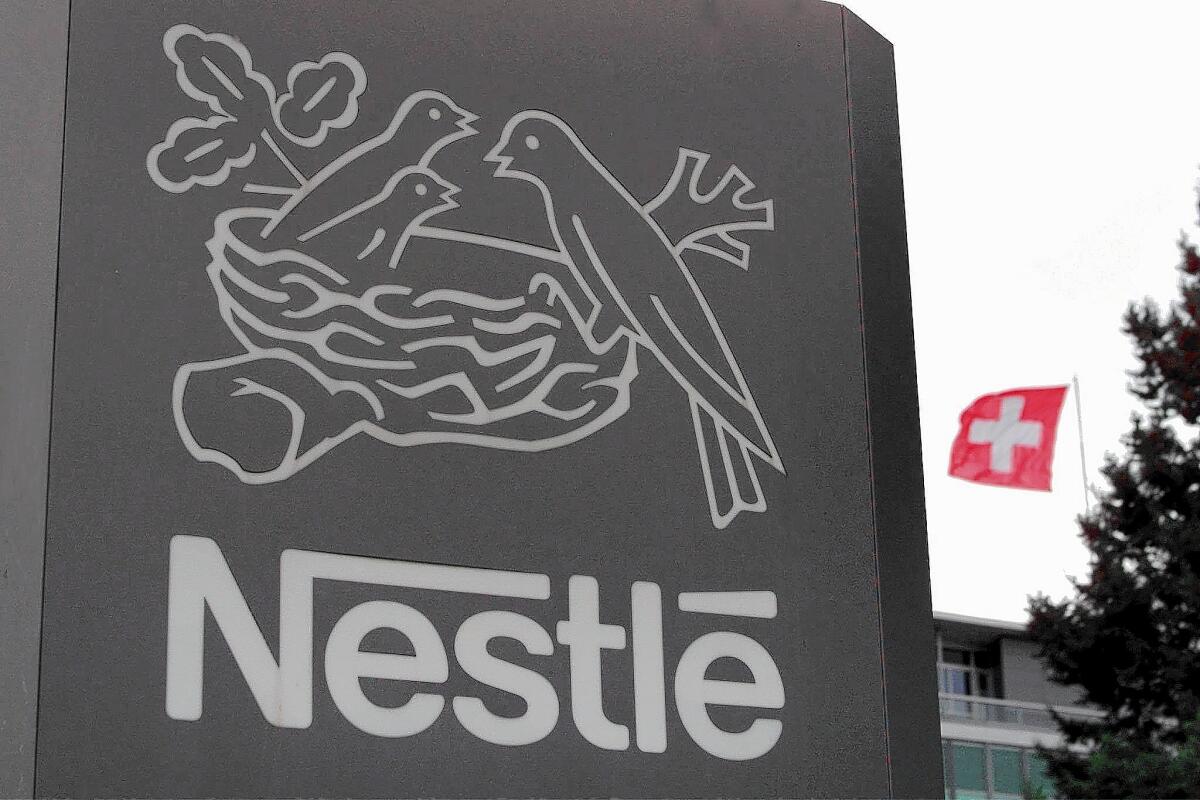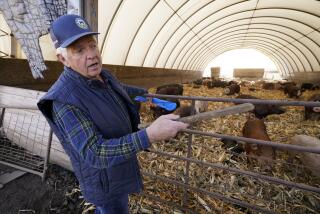Nestle imposes animal welfare standards for suppliers

- Share via
Swiss corporate giant Nestle pledged broad new animal welfare standards for its worldwide suppliers Thursday, becoming the latest major food company looking to limit some of the harmful effects of its global footprint.
The move — described by animal rights groups as the most sweeping food company action to date — would force hundreds of thousands of farms to provide more space for farm animals and phase out controversial practices such as dehorning cattle, castrating animals without painkillers and keeping egg-laying hens in cramped cages.
“We know that our consumers care about the welfare of farm animals and we, as a company, are committed to ensuring the highest possible levels of farm animal welfare across our global supply chain,” said Benjamin Ware, manager of responsible sourcing for Nestle.
The commitment by the world’s largest food and beverage company could potentially ripple across the industry and force smaller firms to adhere to the same practices, animal advocates said.
“That’s the hope, that this sets new standards and starts a new era calling on other food players like Wal-Mart to follow Nestle,” said Matt Rice of Mercy for Animals.
Using a hidden camera, that group captured one of Nestle’s dairy suppliers in Wisconsin abusing cows. The investigation resulted in four farm employees being charged with animal cruelty earlier this year and helped set the stage for Nestle’s announcement Thursday.
Kevin Petrie, Nestle’s head of procurement in North America, said the standards won’t affect retail prices, though the company would probably shoulder an initial investment cost in changing suppliers’ practices.
“We don’t look at this as an economic thing, but as the right thing to do,” Petrie said.
The pledge to improve conditions for animals comes as food companies are facing more pressure than ever from non-governmental watchdogs and consumers to operate transparently and responsibly.
This year, General Mills Inc. and Kellogg said they would report carbon emissions in their similarly vast supplier networks — a crucial step in effectively carrying out their promises to combat climate change.
The commitments were made after international advocacy group Oxfam published environmental score cards for the world’s 10 largest food and drink companies. Oxfam focused on suppliers because the majority of carbon emissions come from indirect operations such as contracted farms.
“Even the companies themselves have been surprised by how much impact they’re having on people at the far ends of their supply chain,” said Chris Jochnick, director of private sector for Oxfam.
Beyond the harm to their reputations, Jochnick said, food corporations have been driven to act by the rise of ethically minded institutional investors and the need to promote social and environmental stability among suppliers in far-flung corners of the globe.
In addition, the Internet and social media have made it easier to disseminate information about company practices worldwide and form grass-roots campaigns for change. Intensifying the effort is the fact that food is inherently an emotional issue for consumers.
“It is a food revolution. People are paying more attention than they ever have in history and coming to terms with what the food industry has been doing,” said Vani Hari, a blogger better known as the Food Babe, who launched several consumer campaigns, including one that pressured restaurant chain Subway to remove a chemical in its bread that’s also used to make yoga mats.
“People want to know where their food comes from, and in order to survive the next decade, the food industry will have to change,” Hari said.
Nestle, the maker of popular brands such as Carnation, Dreyer’s and Hot Pockets, said it would partner with World Animal Protection International, a nongovernmental organization, to shore up its animal welfare guidelines and practices.
The company said those guidelines will be issued to its 7,300 suppliers and the thousands more farms those suppliers contract with to deliver dairy, meat, poultry and eggs.
Nestle has commissioned SGS, a Swiss independent auditor, to conduct checks along the supply chain. Some of those checks will be unannounced and attended by members of World Animal Protection, Nestle said.
The commitments have been followed closely by other animal welfare groups, including the Humane Society of the United States.
The group has been working to eliminate gestation crates, small pens that immobilize breeding sows their entire lives. Nestle joins other large pork producers, such as Cargill, Smithfield Foods, Hormel and Tyson Foods in promising to phase out the crates.
Nestle will differ the most with mainstream practices on dehorning, castrating and removing the tails of animals without painkillers, the Humane Society said.
Wayne Pacelle, the organization’s U.S. president and chief executive, wrote in a blog post Thursday that Nestle’s new plan was “the most comprehensive and ambitious animal welfare program by a global food retailer to date.”
More to Read
Inside the business of entertainment
The Wide Shot brings you news, analysis and insights on everything from streaming wars to production — and what it all means for the future.
You may occasionally receive promotional content from the Los Angeles Times.











